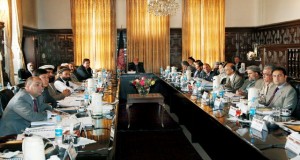Just One Week Before Jirga on US Troop Immunity, Reuters Finds Afghan Murder Investigation Stymied by Immunity
With Hamid Karzai’s loya jirga only about one week away, Reuters has published information that adds fuel to one of the major objections to the new Bilateral Security Agreement between Afghanistan and the US that the jirga is meant to bless. Despite clear evidence provided recently in full by Matthieu Aikins that US special forces were involved in the murders of a number of civilians in the Nerkh district of Maidan Wardak province, Afghanistan’s security directorate has had to close their investigation into those deaths because the US will not provide access to the troops who were involved. The current status of forces agreement provides full criminal immunity to US troops and it is widely believed that criminal immunity going forward after 2014 will be the key decision point at the jirga and for Karzai signing the agreement.
For their article, Reuters came into possession of a report from Afghanistan’s National Directorate of Security that was written in September:
Afghanistan’s intelligence service has abandoned its investigation into the murder of a group of civilians after being refused access to U.S. special forces soldiers suspected of involvement, according to a document obtained by Reuters.
/snip/
In the report authored by Afghanistan’s National Directorate of Security (NDS) intelligence agency, investigators said they had asked the United States for access to three U.S. Green Berets and four Afghan translators working with them but were rebuffed.
“Despite many requests by NDS they have not cooperated. Without their cooperation this process cannot be completed,” said the report, which was originally published on September 23.
U.S. military officials were not immediately available for comment but they have long said the Green Berets did not take part in, or turn a blind eye to, illegal killings in Wardak.
Yeah, right. How can the US claim they didn’t turn a “blind eye” when, among the many things Aikins documented, it was clear that Zakariah Kandahari was in Facebook contact with the special forces unit in question while he was officially “missing”?
There has been much posturing over the jirga in recent days, with assemblies of politicians and other leaders being called to both support and oppose any approval of the bilateral security agreement. The Taliban also has weighed in, warning that any tribal leaders voting for the US to retain a presence in Afghanistan will be targets of future attacks.
Of course, the US claims that even though US forces are immune from being charged by Afghan authorities, US troops are subject to the military justice system and that crimes are investigated and prosecuted. However, given the rush to prosecute only Robert Bales on the Panjwai massacre even though it seems quite possible he had help with at least some of those killings, by blocking Afghan access to the remainder of the death squad involved prompts speculation that Kandahari will be the scapegoat for the Nerkh killings, especially since the US continues to maintain that Kandahari wasn’t even officially working for the US.
Will the blocking of Afghanistan’s investigation into these brutal murders be the final straw that blocks approval of immunity and the BSA?


